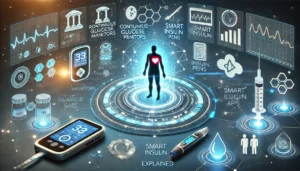Revolutionary Type 2 Diabetes Treatment Reduces Long-Term Insulin Dependency
Type 2 diabetes has been at the forefront of health concerns worldwide, affecting millions of individuals with its chronic nature and complex management needs. Traditionally, sufferers have relied heavily on insulin therapy to regulate their blood sugar levels. However, a groundbreaking development now promises to change this demanding aspect of patient care, potentially freeing individuals from long-term insulin dependency.
The New Frontier in Diabetes Treatment
Recent research and medical advancements have led to the innovation of a new treatment strategy. This novel approach is poised to revolutionize how type 2 diabetes is managed, offering hope to those who have found current treatments cumbersome and invasive. At the heart of this treatment lies an innovative procedure that significantly reduces the need for patients to rely on insulin injections.
Understanding the Science Behind the Innovation
The crux of this new treatment is its ability to target the root cause of insulin resistance, which is a significant contributor to type 2 diabetes. Traditional treatments often focus on managing symptoms rather than addressing the underlying problems. This innovative therapy employs a multifaceted approach involving:
- Regenerative medicine: Techniques that aim to repair or replace damaged cells
- Metformin alternatives: New compounds that mimic the benefits of metformin
- Gut microbiota modulation: Manipulating gut bacteria to improve insulin sensitivity
With these strategies, the treatment restores the body’s natural insulin production and regulation capabilities, reducing the dependency on external insulin sources.
Key Benefits of the New Treatment
The implementation of this treatment not only addresses the fundamental challenges of type 2 diabetes but also presents several other benefits that enhance patient well-being:
- Reduced need for daily injections: Patients can potentially eliminate the inconvenience and pain of daily insulin administration.
- Lower risk of hypo- and hyperglycemia: Natural regulation of blood sugar levels decreases the likelihood of dangerous fluctuations.
- Improved quality of life: Patients experience enhanced energy levels and improved overall health markers.
- Decreased financial burden: The reduction in insulin use and related supplies can lead to significant cost savings.
Engaging Patient Participation
This treatment highlights the importance of patient engagement and education. Healthcare providers encourage patients to adopt a holistic approach to their health, emphasizing diet, exercise, and lifestyle choices that complement the innovative therapy.
Global Implications and Accessibility
The potential for this treatment extends beyond individual health improvements. On a global scale, reducing insulin dependency can alleviate healthcare burdens in multiple ways:
- **Decreased strain on healthcare systems:** Fewer hospital visits and complications related to improper insulin use.
- **Enhanced accessibility:** As the treatment gains approval and becomes more widespread, it promises to reach populations with limited access to insulin supplies.
- **Sustainability and resource allocation:** Reducing insulin production impacts the environment positively and reallocates resources to other healthcare needs.
To ensure universal access, healthcare leaders and policymakers are working toward reducing costs and ensuring equitable distribution across geographic and socio-economic boundaries.
Challenges and Considerations
While this treatment offers significant promise, some challenges remain. These include:
- **Cost and insurance coverage:** Initial costs may pose a barrier to access, and discussions around insurance coverage are ongoing.
- **Long-term studies and efficacy:** Continuous research is required to confirm long-term outcomes and potential side effects.
- **Training and education for healthcare providers:** Ensuring that medical staff is adequately trained to administer and support this treatment.
A Call to Action
The breakthrough presents an unparalleled opportunity to reshape the management of type 2 diabetes. It beckons a collaborative effort among researchers, healthcare providers, and policymakers to facilitate the transition towards a treatment model that benefits millions and improves global health outcomes.
By transforming how diabetes is managed, this innovative treatment spearheads a new era in chronic disease management, reducing the financial and emotional burden associated with long-term insulin dependency. As research progresses, the potential for wider adoption and greater impact in the coming years looks promising, offering hope for a healthier, more independent future for type 2 diabetes patients worldwide.
“`



